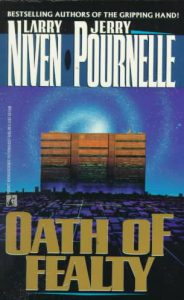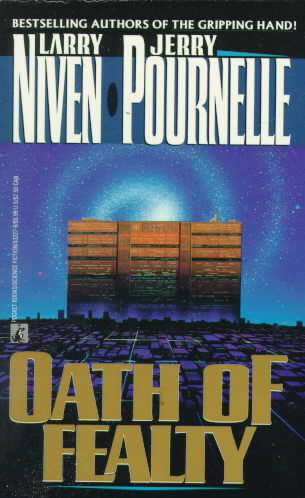Jerry Pournelle passed away in early September and is memorialized in this week’s “Upstream” segment of the Radio Free Acton podcast. An accomplished man in many fields in both the public and private sectors, he perhaps is best known as the author and co-author of a shelf-full of science-fiction novels. Among them is Oath of Fealty, a 1981 collaborative effort with Larry Niven, another sci-fi legend.
podcast. An accomplished man in many fields in both the public and private sectors, he perhaps is best known as the author and co-author of a shelf-full of science-fiction novels. Among them is Oath of Fealty, a 1981 collaborative effort with Larry Niven, another sci-fi legend.
The novel gained a reputation as a classic of libertarian fiction despite the fact it doesn’t reflect your standard-issue libertarian themes of the individual verse the group. Instead, Pournelle and Niven promote a futuristic form of feudalism.
Among those who offered Pournelle and Niven notes and advice was Robert A. Heinlein, who penned the libertarian-themed classic, The Moon Is a Harsh Mistress. The co-writers even dedicated Oath of Fealty to Heinlein and reference him directly in the book by crediting him with creating the concept of “Waldo operators” – a form of computerized remote control that allows humans to maneuver complex machinery from considerable distances.
It’s fairly common knowledge among socially conservative libertarian geeks that Pournelle and Russell Kirk were friends. The author of The Conservative Mind and Pournelle first met at the University of Washington, where Kirk lectured in 1962 and Pournelle was a doctoral candidate in political science. Kirk invited the student to write him, and that he did – albeit a year later – with a lengthy, six-page, typewritten letter.
Essentially a crie de coeur of a 28-year-old man at odds with his country’s increasing liberalism and conservatism’s marginalization, the April 11, 1963, letter foreshadows themes addressed nearly two decades later in Oath of Fealty and still prevalent 40 years after that in contemporary America:
I first read your books when I was playing at being a socialist at the University of Iowa ten years ago. I had never been a very good socialist, but I did manage to be a good organizer, and I tried to be conscientious. I had disliked the Right wing parties, although by my Southern upbringing [Louisiana] I should have known that I would not be able to stay away from them. But your books, read in order that I might criticize, like them, that influenced me. I was, and still am, disgusted by the usual outpourings of the Liberals who are clasped to the bosom of the Right today.
That is my dilemma. I find myself very comfortable with your works. I am at home with Burke. But I am in no way at home with what masquerades as conservatism on our campus, or which reaches me through the courtesy of Irvington-on-Hudson [the then-address of the libertarian Foundation for Economic Education or FEE]. It is all very well for us to ally temporarily with the enemy as a tactical trick for political purposes; but I cannot clasp these “individualists”, these atomists, to my bosom. I am not comfortable when they act as if limiting government were the same as detesting government; and I tremble when they tell me that when men are freed from the influence of the State, they will develop into splendid beings.
I think it monstrous that the conservative is asked to stand aside while the “individualist” industrialist destroys everything familiar; indeed, do more than stand aside, actively defend his right to do so without the interference of the State or the community. I do not think it amazing that the populace turns to the Liberal when we offer him nothing but the consolation that the invisible hand will construct for him a materialist world beyond the dreams of avarice [the title of a 1956 book by Kirk, a phrase taken from an 18th century play by Edward Moore]. I suspect that he would rather not have quite so much in the way of material goods, and quite a bit more assurance about enjoying those he has. When the conservative, the man of virtue, the party of virtue, talks like a Manchester industrialist, how can we blame the people from turning to the unions and the State for help? We taught him to do so.
[Letter excerpted with minimal corrections from the archives of the Russell Kirk Center for Cultural Renewal, courtesy of Annette Kirk]
All this is heady stuff with which your writer mostly agrees despite the fact he occasionally writes on cultural matters for FEE.
Pournelle’s disagreements with FEE and other economic libertarian groups (termed “chirping sectaries” by Kirk) didn’t prevent him and Niven from naming one of Oath of Fealty’s protagonists Tony Rand, presumably after Ayn Rand. Further, the character – like Howard Roark in Rand’s novel The Fountainhead – is an architect of sorts. Tony Rand serves as chief engineer of the Todos Santos “arcology” – a self-enclosed environment of shops, industry and housing built as a refuge from a crime- and pollution-ridden Los Angeles of the future that conjures memories of Galt’s Gulch in Rand’s Atlas Shrugged.
Further, Pournelle and Niven align nicely with FEE, the Acton Institute and other free-market, small-government proponents when they chide the layers of bureaucracy with which businesses are forced to contend both to the detriment of their own success and potential customers: “Every department of every government at every level is involved, and all those expensive people think they have to contribute to justify their salaries, and every contribution is another delay,” proclaims another of the novel’s characters.
Throughout the book, Todos Santos is compared to a feudal society wherein egalitarianism is unmasked as an unattainable goal. Except in this futuristic tale, residents don’t envy the success or wealth of others, because they recognize the incumbent tradeoffs.
‘Feudal societies are always complex: everyone in such a society enjoys rights, but few have the same rights. There is not even a pretense of equality – of rights, nor of duties and responsibilities.
‘There is, however, loyalty, and it runs both ways. The Todos Santos resident is expected and required to be loyal, but in return, Todos Santos gives protection.…‘Loyalty and protection,’ Lunan said. ‘The ties of the Oath of Fealty run in both directions. The trend of the United States has been to cut all ties, so that individuals are alone. The citizen against the bureaucracy, against ‘them,’ only nobody is really in control and you can’t say who ‘they’ are.
Todos Santos is threatened by an increasingly militant group calling itself Friend of Man and the Earth, or FROMATE for short. Except for what would be considered a blatantly sexist name by contemporary environmental extremists, FROMATE predicts many of today’s violent pantheists.
If anything, the circumstances Pournelle and Niven were lampooning in 1981 have only been exacerbated in the three decades since. As this piece is written, FEE (of all sources) published a story with the title “Toddler Denied Kidney Transplant Because Donor Violated Parole” about a youngster born without kidneys forced to suffer because his donor father … well, readers (it is hoped) get the picture.
Tony Rand also takes time to explain the imagined complexity of a future U.S. tax code to a Canadian and how Todos Santos addresses it:
[S]uppose you just didn’t want to bother learning how to make out an income tax form? And deciding what’s deductible every time you spend ten bucks, knowing some supercilious son of a [gun] is being underpaid to second-guess you? And keeping little pieces of paper to prove it? It’s a fun game, but why does everyone have to play. Sometimes it feels like the government wants to turn everyone on Earth into accountants…. Accountants and lawyers. Half the government is lawyers, and when they make laws they don’t write them in English. Nobody but a lawyer can tell legal from illegal, and the lawyers can’t tell right from wrong anymore….
Independence is a lot of what we’re selling.
All the above – as well a prediction in 1981 that Star Wars would inspire a seventh sequel!
Oath of Fealty isn’t perfect by any stretch – most of the characters are archetypes rather than fully realized, and the scenes featuring lovemaking are awkward and embarrassing, perhaps intentionally as another acknowledgment of the wince-inducing attempts by Heinlein and other sci-fi authors of the era. Nevertheless, the book succeeds as a prescient work of futuristic fantasy stemming from the realities of the era in which its authors wrote it as well as the realities of today.
